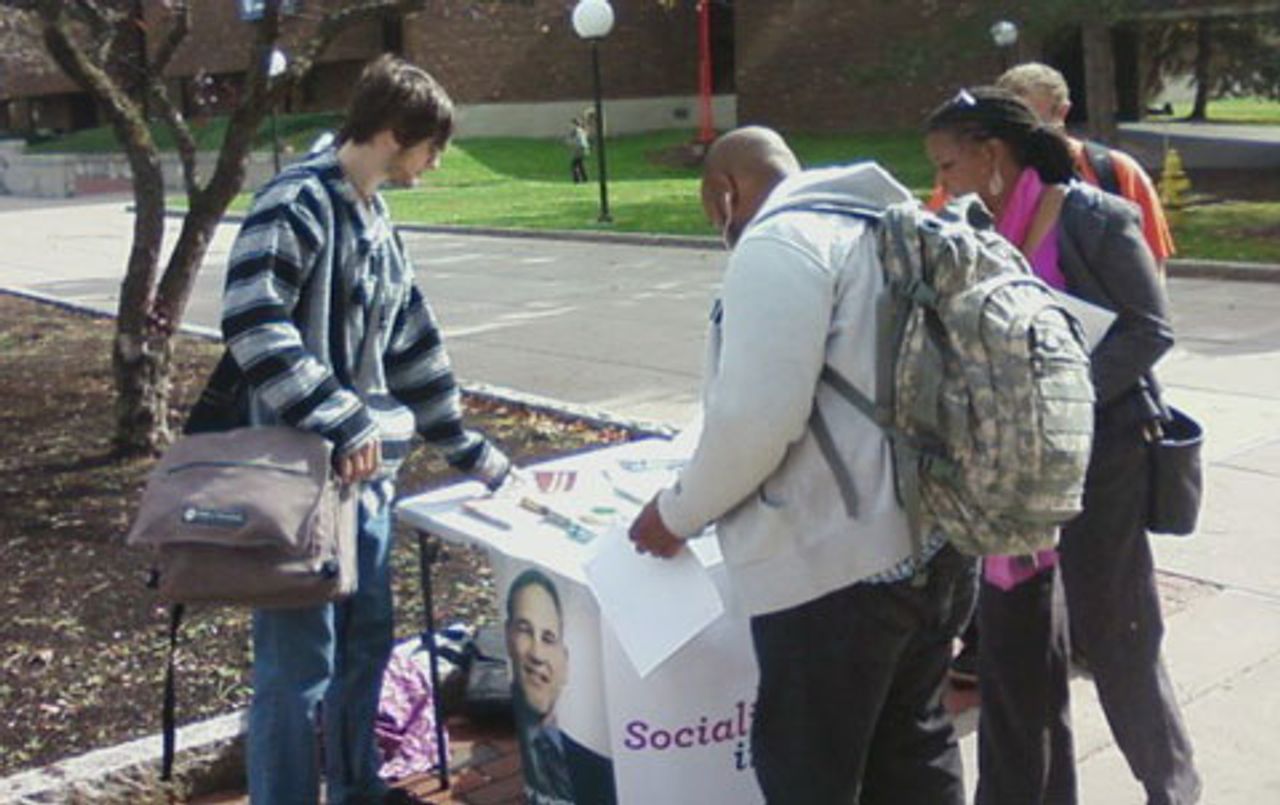Socialist Equality Party vice presidential candidate Phyllis Scherrer spoke at a public meeting in Syracuse, New York on Monday. Campaigning for the meeting, Scherrer spoke with Onondaga Community College students, fire fighters and other workers in Syracuse who expressed a deep interest in the program of the SEP.
Students and workers were eager to discuss the growing social crisis enveloping Syracuse and the US. Syracuse and other major upstate New York cities have been hard hit by the past four years of austerity imposed by the Obama administration after the crash of 2008. The official unemployment rate in Syracuse is 10.7 percent, an increase of 1.2 percent from this past spring. This is due in part to the closing of the Magna New Process Gear plant in August with the help of the United Auto Workers.
Zach, a young worker at RadioShack, spoke with Scherrer. “I’m out of school right now because of money and working part-time. When I was in school, I had to hold a full time job to pay for it and to get here. I travel here from Cortland.”
Cortland is a nearby town thirty minutes from Syracuse by car. “It was $20 per day to get here by car or $27 by bus. And my car broke down, so I’m paying a lot more just to get up to Syracuse to work.”
Zach then asked Scherrer to explain more about the history and principles of the SEP.
Scherrer explained that the SEP bases itself on the struggle waged by Leon Trotsky, one of the key leaders of the 1917 Russian Revolution, for an internationalist socialist perspective against Stalin’s conception of socialism in one country. The SEP candidate explained that the working class was an international class, and American workers could only defend their interests by uniting with workers in Asia and around the world against the capitalist system.
Scherrer pointed to the struggle of Chinese workers at Apple’s Foxconn plant, which is stalling the production and distribution of the iPhone 5. Zach responded, “Oh, so the Foxconn strike explains why the RadioShack where I work doesn’t have any iPhone 5s in.”
 Students at Onondaga community college discussing the SEP’s program with Scherrer
Students at Onondaga community college discussing the SEP’s program with Scherrer Mike came to the table to find out what the SEP’s view was on socialism. “Capitalism is definitely not working. I know that there has to be something better than this. Can you explain to me exactly what your program is?”
The candidate reviewed the election statement and the SEP program statement with Mike. “I like the idea of socialized production and workers’ democracy worldwide. I always felt like there had to be a real socialism that made sense.”
During the public meeting Scherrer said the working class in the US and internationally was being forced to pay for the capitalist crisis. “The financiers that caused the crash in 2008 have gone unpunished and opposition from the working class has been met not with social reforms, but state repression.”
She cited the role of the African National Congress, which ordered the massacre of striking platinum miners at Marikana mine in South Africa. She also explained that the Spanish and Greek governments were cracking down on popular resistance to the unprecedented austerity measures in those countries dictated by the European Union.
“In the US,” Scherrer said, “There is more and more a growing opposition not just to austerity but also to the new wars being planned against Syria, Iran and ultimately China. The American people are opposed to war in general including with Iran. The response of the American ruling elite to this opposition is scaffolding a massive police state apparatus.”
Scherrer also reviewed the experience of the Chicago teachers’ strike, and spoke on the SEP’s intervention in that struggle. She explained the betrayal of the struggle by the Chicago Teachers Union, which is tied to the Democratic Party, and which fully accepted Mayor Rahm Emanuel’s demands for the shutdown of more than 100 schools.
After the main report a retired professor from Syracuse university asked, “Was India under Nehru a socialist country?”
Scherrer explained that India was not a socialist country. The working class has not taken power in India. Instead, the Indian National Congress, like the ANC in South Africa, represented the interests of the native capitalist class. More than sixty years since so-called independence, the Indian bourgeoisie oversaw mass poverty and the brutal exploitation of the Indian workers and peasants by global corporations.
“Only the October Revolution in Russia laid the seeds for a socialist society,” Scherrer said. “But even then, both Lenin and Trotsky, the leaders of the revolution, knew that without international support, what the workers had achieved in Russia was doomed.”
Scherrer said the Bolshevik revolution was the beginning of a global reorganization of society based on workers’ democracy, and the redistribution of wealth from the elite to the population as a whole. Stalinism and its program of “socialism in one country” led to the collapse of the USSR in 1990-91, Scherrer explained. In its struggles against the world capitalist system today, she said, the working class has to base itself on the international perspective fought for by Trotsky and the Fourth International.
